The Third Malón of Peace remains in the city of Buenos Aires with a vigil in front of the Supreme Court, where they denounce the irregularities of the constitutional reform in Jujuy. Verónica Chávez and Liliana López, indigenous women, stand on the asphalt of Buenos Aires and testify to the violation of rights, denounce extractivism and reaffirm their decision to defend their territories.
The Third Malón de la Paz has been in Buenos Aires since the 1st of August, in a vigil-camp in front of the Supreme Court of Justice, waiting for a ruling on the express constitutional reform carried out by the governor and vice-presidential candidate, Gerardo Morales. The Plaza Lavalle area, so accustomed to suits and ties, is full of whipalas and posters with the demands of native peoples who travelled more than 1500 kilometres for it to make themselves heard.
“They want our territories and the water we live on. All for lithium and their electric cars,” warns Verónica Chávez, one of the spokespersons for Salinas Grandes, an area targeted by mining companies and governments. In a low but firm voice, she makes it clear that they will stay until they have a response and warns that this is not just about Jujuy: “The same thing is happening all over the country, they want to steal the territories of the native communities”.
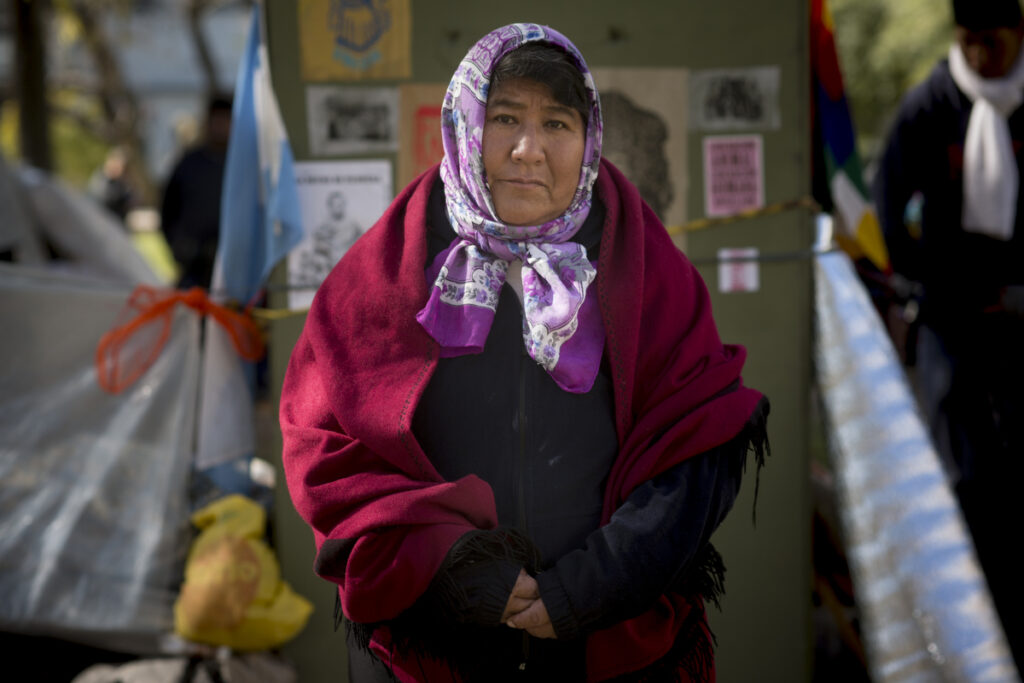 Verónica Chávez, from Salinas Grandes. Photo: Nicolas Pousthomis
Verónica Chávez, from Salinas Grandes. Photo: Nicolas Pousthomis
“They want to steal the territories of the native communities”. –
Why are they here?
-Governor Gerardo Morales reformed the Constitution behind our backs. The law that says they say we have to be consulted was not complied with. That is why we are requesting the nullity of this reform and the intervention of the province.
-We have been in Buenos Aires for more than ten days. What response have you had?
-Neither the judges nor the government received us. We presented notes, requests, but we have had no response. What can be seen is that there is no will from the judges (the Supreme Court is made up of Horacio Rosatti, Carlos Rosenkrantz, Juan Carlos Maqueda and Ricardo Lorenzetti).
-Why do you think the judges do not receive them?
-They also have something to do with what the governor of Jujuy did.
-Why is that?
-In some way, they also have something to do with the governor’s business. They are at least accomplices of Morales.
In addition to the lack of consultation as stipulated in ILO Convention 169 (a norm of supra-legal rank, above local laws), why do they reject the constitutional reform?
-By not respecting Convention 169, they have already gone over our rights, and furthermore the reform has many articles that go against us, against our own lives and our territories, especially water.
-Why?
-Gerardo Morales’ reform is happening, for example, because he couldn’t get in with the mining companies in the Salinas Grandes. So, he is going to reform the constitution to put us all in jail. And this is not only happening in Salinas Grandes and the Guayatayoc Basin. The same thing is happening all over the country, they want to steal the territories of the native communities. Everything is happening because we care for the territory and we oppose its contamination.
-With the new provincial government (Carlos Sadir) do you have any expectations?
-We have no expectations, it’s the same as Morales. With him and Morales there is no guarantee that we will be free. In Jujuy we are persecuted and we are in danger. And that beautiful Salinas that everyone visits is going to be destroyed by the government and the companies.
-There are sectors that say they need lithium for electric cars, so they don’t pollute as much as petrol cars. How do you respond to these politicians, businessmen, journalists and scientists?
-Everything they say about electric cars… they should first see where the lithium is being removed, who lives there… We don’t want to be sacrificed so that they can drive around in an electric car. And it’s not our fault that the world is polluted. Let them go and see how we live, how we take care of the territory and the animals. We are going to defend our territory and our lives. We are not going to let them sacrifice us so that others can drive around in electric cars.
-How long will you stay in Buenos Aires?
-Till the reform spills out.
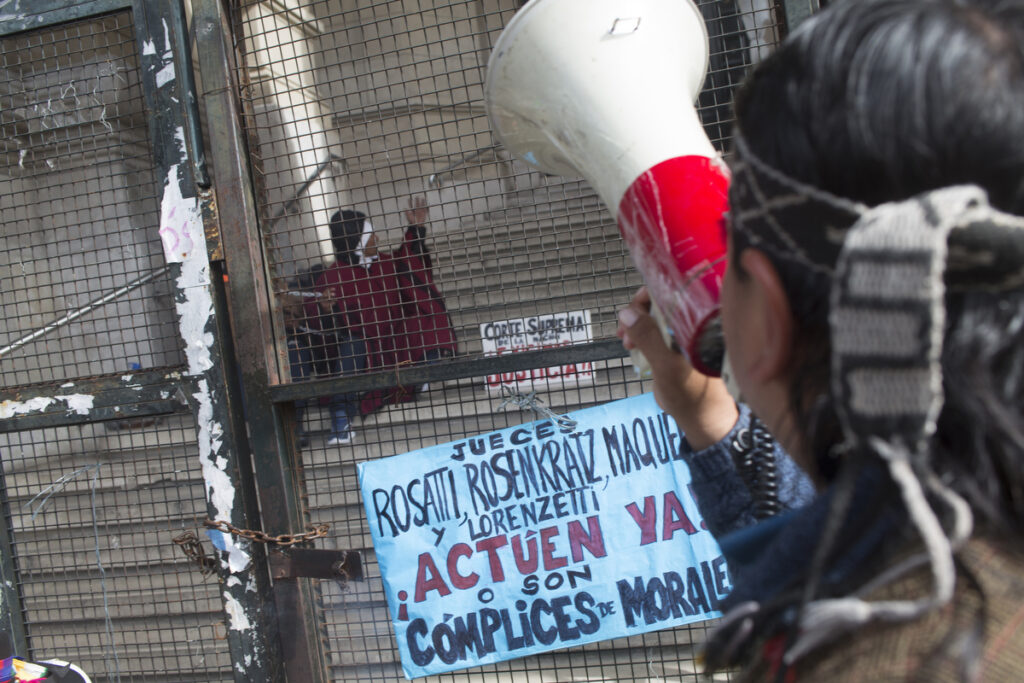 Photo: Nicolas Pousthomis
Photo: Nicolas Pousthomis
Plurinational Assembly and UTEP
On Wednesday morning a “plurinational assembly” was scheduled with the communities of the vigil, social organisations (such as the Coordinadora Basta de Falsas Soluciones), left parties and individual supporters. On Talcahuano Street there were about 150 people, who, megaphone in hand, were passing the word to each other. They reiterated the demand to be received by the Supreme Court judges, the situation of the indigenous peoples and the need to achieve the strength and number of supporters to be able to set up tents (the city police still do not allow this).
The assembly was going along normally, for almost an hour, when suddenly a large column of the Unión de Trabajadores de la Economía Popular (UTEP) appeared on Tucumán Street. There were a lot of them. And they took over the assembly. Several of them spoke. Esteban “Gringo” Castro was perhaps the most concrete. He pointed out that the UTEP had held a plenary and that they had voted on two actions: “to initiate a plan of struggle” (four months before the end of the government they support) for food for the soup kitchens and popular sectors. The second point, the organisation decided to support the Third Malón de la Paz. After giving its speech, the UTEP left the assembly.
Delfina del Sel of BFS took the microphone. She stressed that extractivism is a state policy, of all governments, including the current one and the one that will come after 10 December. He requested that the UTEP stay to agree on actions, but the organisation (led by Castro) left along Lavalle Street towards the Obelisco.
The assembly continued to evaluate the steps to follow from the vigil in front of the courts in Plaza Lavalle.
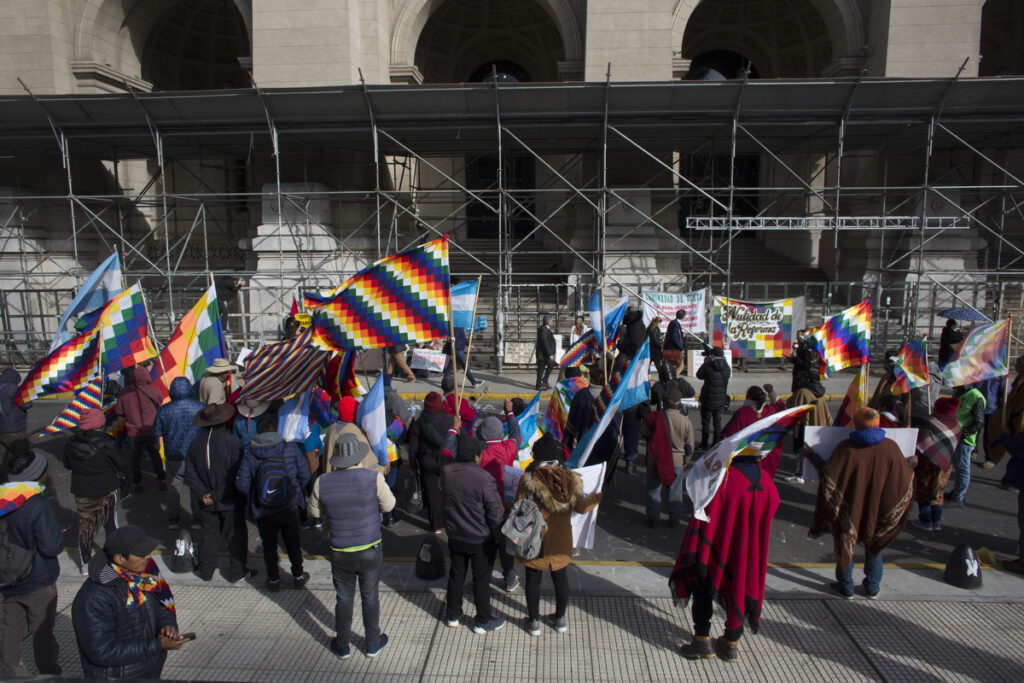 Photo: Nicolas Pousthomis
Photo: Nicolas Pousthomis
“They discriminate against us because of our skin colour”.
Liliana López is 25 years old, from the indigenous community of Abra Pampa, and this is the first time she has visited the city of Buenos Aires. She and her family raise sheep, goats, llamas and cows. She explains that she joined the Third Malón de la Paz because the lives of the indigenous peoples are at risk and “the injustice is already too great”.
-Why does she oppose constitutional reform? -It is a reform in which the consent of none of the communities has been taken. It harms us all. Especially our natural resources, such as water and land. And we came here because we want a response from the national authorities. We can no longer expect anything good from the Jujuy authorities.
Do you think there is a link between the reform and mega-mining?
-Yes, obviously, because for years they have been insisting on the issue of mining. Before it was gold and silver, now they are coming for lithium, which is leaving our people without water, and that is unfair to all of us. We live from water and from the land where we have our livestock. The mining companies have already plundered the soil and water of Jujuy, and we know that they are harming us. That’s why we say we don’t want mining.
How are you living these days in the city? How are the people here treating you?
-There are many good people who help, but there are also many who discriminate against us, like the politicians, because of our skin colour, because of the way we dress, they are closed to what we come to tell them. Some people told us that we are from Bolivia.
How long are they going to stay?
-Until they give us a favourable response. Because if we leave here without a response, in Jujuy the injustices will continue, the persecution and mistreatment of each one of our people will continue.
You highlight the role of Gerardo Morales as the person most responsible. Does the national government have any responsibility?
-Yes, because the President didn’t want to receive us either, he doesn’t hear us, and they don’t give us a solution either.
What message would you give to the inhabitants of this city?
-Water is not for sale, water is defended! No to lithium!


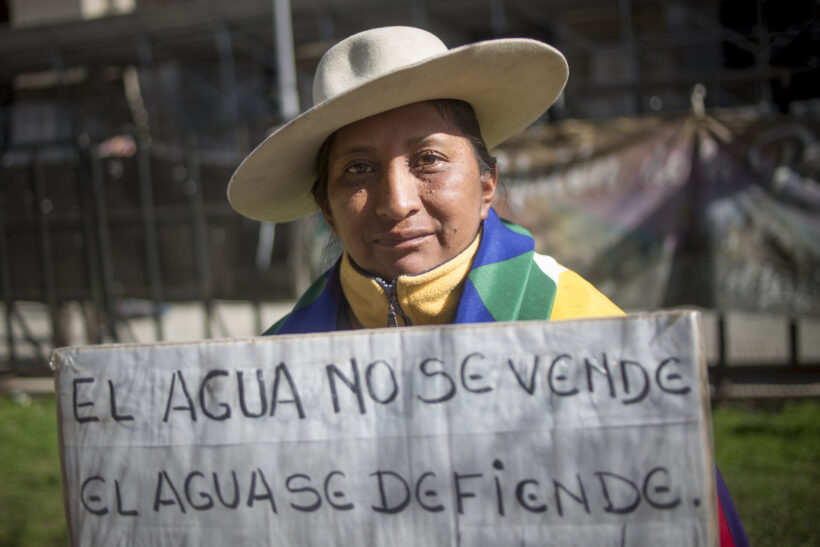
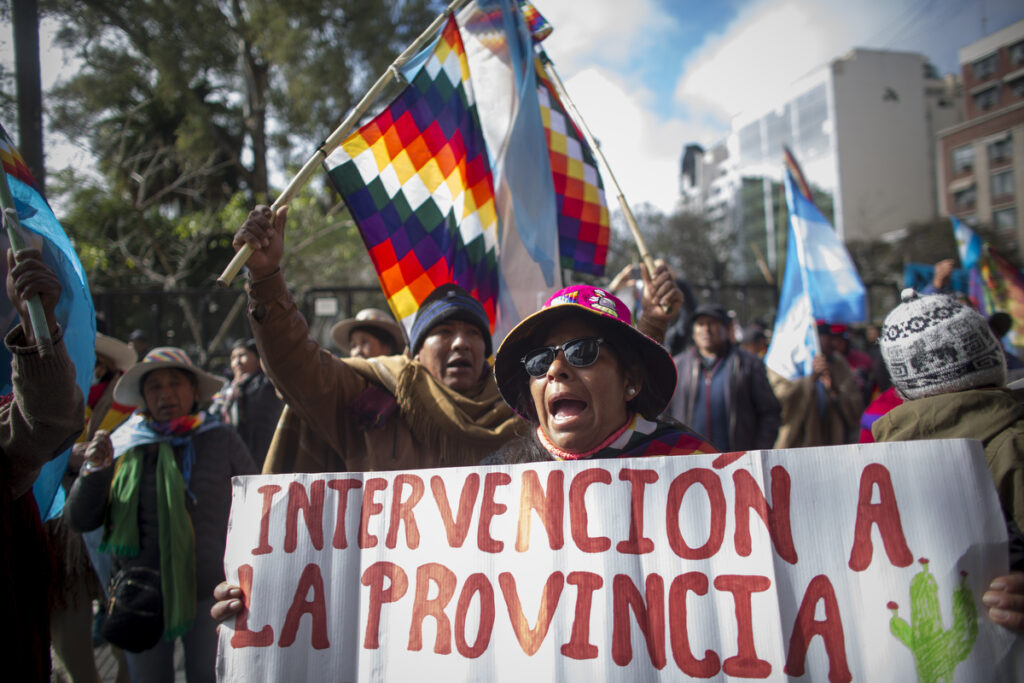 Photo: Nicolas Pousthomis
Photo: Nicolas Pousthomis






